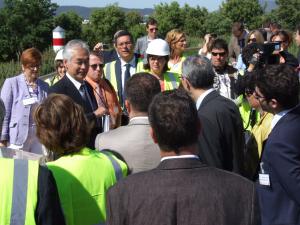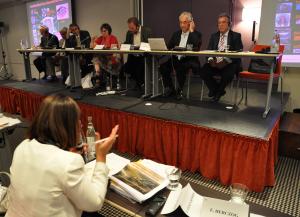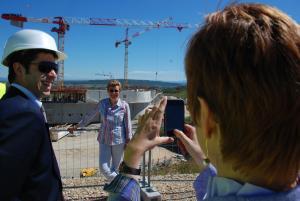Close up and personal
20 May 2011
-
Sabina Griffith
Proud of what has been accomplished so far, ITER Director-General Osamu Motojima welcomed the delegates of the European Parliament on the construction site.
Some 20 members of the European Parliament (MEPs) came to the ITER site in Cadarache last week to take a closer look at the project's material and budgetary developments. During their three-day visit the MEPs had intensive discussions with representatives of the ITER management, the European Domestic Agency, and local authorities.
The principal motivation for the delegates' trip from Brussels to southern France was the issue of EUR 1.3 billion in extra funding that will be necessary to cover the European contribution to ITER for the years 2012 and 2013. In December, a plan to secure European financing of ITER was rejected by the European Parliament.
"Our objective in coming here to ITER was not to discuss the principle of our support to the project," the French Christian Democrat Damien Abad said, who, at 31, is the youngest member of the European Parliament. "We acknowledge the efforts made by the ITER Organization to enforce stricter and more efficient management rules." "But," adds Ingeborg Grässle, a Christian Democrat from Germany, "we need to know how reliable the new cost estimates are."
For three days, the MEP discussed important issues with ITER management, including the question of EUR 1.3 billion in extra funding from Europe.
The highlight of the three-day discussion marathon taking place in a hotel in Aix-en-Provence was an extensive tour around the ITER construction site, which left even the Green delegate Bart Staes from Belgium, co-chair of the delegation, impressed: "I must say that for us, until yesterday, ITER was a paper project. Visiting the site has changed this perception—we now feel it is reality."
Pleased to show that "France supports the ITER Project as much as possible by complying with its commitments on time and to specification," Bernard Bigot, Administrateur général du CEA (Chairman, French Atomic Energy Agency) used the microphone in one of the two buses to give a running commentary on the site visit. "The European Parliament plays a very important role in the implementation of the European involvement in the ITER Project," he said afterwards. "I see it as highly positive that a delegation of MEPs decides to come to the site here in Cadarache to get first-hand information on ITER, as they will have to make an important decision about the extra funding for the years 2012-2013. ITER Director-General Osamu Motojima and the Director of Fusion for Energy, Frank Briscoe—as well as their teams—have done an excellent job in showing precisely the state of advancement of construction works and their capability to manage the project in a very professional way."
A tour around the ITER construction site was a welcome break during the meeting marathon and a unique photo opportunity for many MEP like Monika Hohlmeier, a Christian Democrat from Germany.
At the press conference that concluded the MEP visit, the Social Democrat Anne Jensen from Denmark summarized the outcome as "fruitful." "We had good discussions with the people involved in the management of the ITER Project," she said, underlining once more that the purpose of the visit was not to discuss the project as such. "The European Parliament is in favour of ITER," she stressed. "However we needed an assessment of cost, cost increase, and cost-related risk. We wanted to make sure that the management structure is such that the risks can be managed. The European Parliament will provide the EUR 6.6 billion the project needs," she concluded. "We now have to carefully assess if it is enough."
In addition to what he said during the press conference, Damien Abad distributed a pamphlet entitled MEPs support ITER. "The vast majority of MEPs support the ITER Project," the document reads. "The present mission has allowed us to see more clearly into a number of issues, and worries, regarding the governance of the project and the increase in the cost. What we are asking for is a more stringent budget policy that will enable the finalization of the project. Nothing would be costlier than stopping the project. The question is not about being pro- or anti-nuclear. It is about creating the conditions of the energetic independence of Europe."
The matter of how to finance ITER will now be reviewed again by the European Parliament in October. "We, Europe, are in the driver seat," Rudolf Strohmeier, Deputy Director-General of the Research and Innovation Directorate within the European Commission, stressed. "It has now become an urgent matter to find a solution." Any delay would not be "for free"; with contracts signed for more than EUR 1 billion, abandoning the project "is not a real option," Strohmeier stressed. "ITER is and will remain an integral part of the European research policy."
In addition to what he said during the press conference, Damien Abad distributed a pamphlet entitled MEPs support ITER. "The vast majority of MEPs support the ITER Project," the document reads. "The present mission has allowed us to see more clearly into a number of issues, and worries, regarding the governance of the project and the increase in the cost. What we are asking for is a more stringent budget policy that will enable the finalization of the project. Nothing would be costlier than stopping the project. The question is not about being pro- or anti-nuclear. It is about creating the conditions of the energetic independence of Europe."
The matter of how to finance ITER will now be reviewed again by the European Parliament in October. "We, Europe, are in the driver seat," Rudolf Strohmeier, Deputy Director-General of the Research and Innovation Directorate within the European Commission, stressed. "It has now become an urgent matter to find a solution." Any delay would not be "for free"; with contracts signed for more than EUR 1 billion, abandoning the project "is not a real option," Strohmeier stressed. "ITER is and will remain an integral part of the European research policy."




